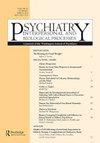Why (Should Psychiatrists) Read Moby-Dick?
IF 2.4
4区 医学
Q2 PSYCHIATRY
Psychiatry-Interpersonal and Biological Processes
Pub Date : 2023-01-01
DOI:10.1080/00332747.2023.2207224
引用次数: 0
Abstract
The majority of the audience is probably thinking that the purpose of this essay is to describe the portrayal of narcissism and ambition in Herman Melville’s memorable character, Captain Ahab. The portrayal is indeed worthy of immortal fame, but alas, that is not the purpose of this essay. Melville barely touches on who Ahab was before he lost his leg, briefly alluding to a wife and daughter left behind or the decades that came before his tragic accident. If his work were used to create a psychiatric history of a Captain Ahab, it would be applauded for its prose, but would likely receive a failing grade for because he included almost no history before the captain was mauled. Who was the man before he encountered this unspeakable natural power? What aspects of his personality were warped by the encounter? Melville gives us preciously little on this topic. So perhaps psychiatrists would not learn much by focusing on the portrayal of the doomed captain. Moreover, Moby-Dick is admittedly a dense and challenging read. With so much medical literature to consume to maintain our skills, why should psychiatrists take the time to brave this American epic? Scholars that have delved between Melville’s dense pages offer some fruitful insights that may help convince our colleagues that this work is worth their attention. In approximately 100 pages, Philbrick (2011) offers a brilliant work outlining a multitude of reasons why readers should brave the intimidating read to enjoy one of America’s greatest novels. Philbrick recognizes that most people were forced to read the book in high school or college, before one had a chance to gather critical life experience or the patience to work through the chapters that go into unwanted extreme detail of whale anatomy. His argument for reading the book centers on Moby-Dicks pervasive role in American culture, becoming akin to a central myth. But Philbrick’s arguments are not specific to psychiatrists, which still leaves the question: why should psychiatrists in particular read Moby-Dick? King (2019) offers a more specific answer to this question in his work exploring Moby-Dick’s vast themes within marine biology, oceanography, and the science of navigation. King describes the marine animals and natural phenomena that appear in the book, expanding upon Melville’s descriptions and adding both the state of knowledge on the topic at the time Moby-Dick was written as well as what is known now. In most of these chapters, he alludes to a theme that Melville frequently returns to in his work: the contrast between the sailors’ knowledge and Ishmael’s skepticism of the “old naturalists” (King, 2019). Much of what people knew about whales in academic circles at the time came from scholars who had dissected many beached whales but had little direct observation of the animals in action. Melville questioned if the writers of the精神科医生为什么要读《白鲸》?
本文章由计算机程序翻译,如有差异,请以英文原文为准。
求助全文
约1分钟内获得全文
求助全文
来源期刊
CiteScore
2.70
自引率
0.00%
发文量
48
审稿时长
>12 weeks
期刊介绍:
Internationally recognized, Psychiatry has responded to rapid research advances in psychiatry, psychology, neuroscience, trauma, and psychopathology. Increasingly, studies in these areas are being placed in the context of human development across the lifespan, and the multiple systems that influence individual functioning. This journal provides broadly applicable and effective strategies for dealing with the major unsolved problems in the field.

 求助内容:
求助内容: 应助结果提醒方式:
应助结果提醒方式:


